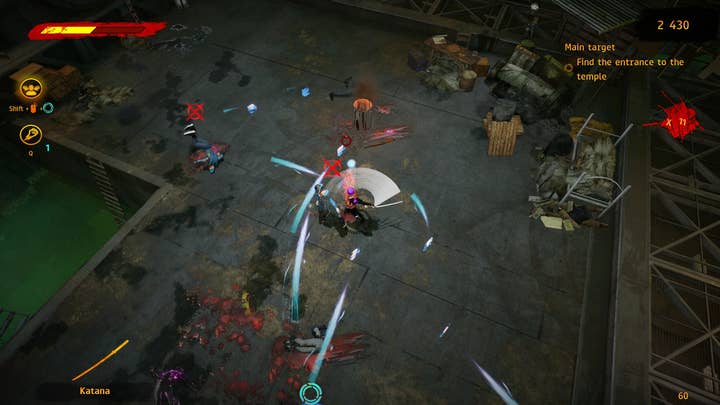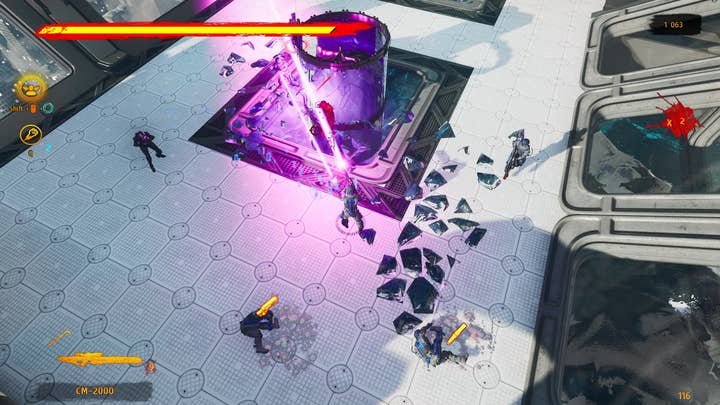Magic Hazard's progression: Developing a narrative-focused shooter through the Xsolla Accelerator
In a crowded gaming market, innovation is crucial. Magic Hazard’s upcoming release, Memory Lost, seems poised to differentiate itself.
Set in the dystopian city of Detraxis, players assume the role of Neural Network, an AI within an assassin robot, fighting for autonomy. Unique gameplay allows players to capture enemy memories and abilities, enabling dynamic and versatile gameplay without repetitive character leveling.
According to Sergei Kuznetsov, founder and CEO of Magic Hazard, the concept originated during a discussion with friends about childhood games and their missing elements. "After hours of chatting, we realized we always wanted to play as our enemies," Kuznetsov stated.
While games like Halo let players wield enemy weapons, Magic Hazard aims to extend this concept by letting players take over enemy bodies and abilities.
_lqkPxkO.jpg?width=720&quality=70&format=jpg&auto=webp)
"This gives players the ability to control a variety of enemies," Kuznetsov explained, highlighting the spectrum of combat styles available, from melee to ranged attacks.
On the narrative side, Kuznetsov elaborates, “Inhabiting an enemy’s body lets you experience their life, which may change your perspective on them,” he added.
"We spent around two years developing just four hours of gameplay," Kuznetsov noted.
Gameplay is designed to keep players engaged by continually introducing new elements like environmental hazards and enemy types.
The game started development in 2020 with a five-member team consisting of a programmer, a game designer, and a few artists. Initial brainstorming sessions focused on conceptual development and exploring new ideas.
The team expanded, eventually growing to 19 members. Kuznetsov balanced another job and side projects to fund the game’s development. After a year, they showcased their prototype at DevGamm and received extensive feedback.
Critiques from experts included unclear mechanics, insufficient enemy variety, weak level design, and basic animations. “We took each point seriously, revamping the game from the ground up for six months,” Kuznetsov said.
The revamped build introduced structured combat and enriched gameplay mechanics. The team also ensured there were intermittent pauses in the action, allowing players to restock and delve into the game’s narrative.

Realizing they needed more resources, the team sought additional aid to complete their narrative-driven, handcrafted game. "Creating a detailed, story-driven game is labor-intensive," Kuznetsov remarked. “We spent nearly two years crafting just four hours of gameplay.”
Inspired by campaign-driven games from the 1990s and early 2000s, the development team has poured their passion for dark humor into Memory Lost, crafting over 90,000 words of engaging text. The story unfolds not just through environmental lore but also via dialogues with two key characters accompanying the heroine, the Neural Network: MARK (Mobile Assistant of the Corporation Worker), acting as a mentor, and the Liaison from the Redsky corporation, the entity responsible for your creation. Player choices—whether to eliminate, spare, or ignore NPCs—impact the narrative, offering multiple endings and ensuring a replayable experience.
The pivotal support Magic Hazard required arrived from Xsolla, a crucial connection Kuznetsov had made in late 2021. Xsolla's announcement of the Accelerator program in 2022, aimed at innovative game developers, opened the door for the studio. A successful demo submission secured their spot in the program.
"Now I understand how to prepare beautiful presentations with gifs or videos that help people looking at your pitch"
One of the significant draws for Kuznetsov was Accelerator's financial backing. After two years of self-sustaining, the additional funds enabled enhancements like animated cutscenes and voice acting, vital for a fully immersive, story-centric game.
The year-long program offered valuable mentorship and lectures, benefiting various aspects of Magic Hazard's evolution as a game business. Kuznetsov notes, “You have consultation hours where specialists in areas from game design to marketing provide guidance,” which was instrumental in their growth.
A critical lesson for Kuznetsov, and a common hurdle for new developers, was understanding how to market their ideas. Effective pitching to investors and publishers often posed a challenge. “My pitches before were basically Google Docs,” he says with amusement. “Now I know how to create visually appealing presentations using gifs or videos that clearly convey our game's potential.”
The additional insights and resources not only ushered in new game features but also refined the onboarding process for players. A strategic move was launching a free Steam demo, titled Chapter One, encompassing the first two levels. This received over 90% positive feedback from players. Kuznetsov admits, “It’s less than 200 reviews, but feedback from Accelerator and others helped us improve, and we’re very pleased with the results.”
Magic Hazard is partnering with ESDigital for the 2024 release of Memory Lost. “Releasing a game on Steam is easy, but without a publisher, it might go unnoticed,” Kuznetsov explains. The publisher’s role includes porting the game to various platforms, localization, and QA, ensuring the game reaches a global audience in optimal condition.
Though some ideas from Accelerator’s program weren't implemented due to time constraints, Kuznetsov is optimistic about including them in future projects. This reflects Accelerator’s broader goal—not just to assist with a single game but to foster long-term business success for studios.
You can now wishlist Memory Lost on Steam and try the free demo.
